- Get link
- Other Apps
- Get link
- Other Apps
KONTAK PERKASA FUTURES - If you're an anime fan, you've probably watched an anime Mari Okada has worked on at some point. Most famous for her anime-original works anohana and The Anthem of the Heart, Okada has been a prolific screenwriter for roughly twenty years. This year saw the release of Maquia - When the Promised Flower Blooms, Okada's first work as a director.
KONTAK PERKASA FUTURES - A series of coincidences led me to cross paths with this screenwriter-cum-director. Last year, she released her autobiography, titled From Truant to Anime Screenwriter: My Path to anohana and The Anthem of the Heart, which I summarized in an article here on ANN. Later on, when J-Novel Club licensed the book in English, I was asked to translate it.
In preparation for the English eBook release on May 5, we present this interview with Mari Okada, which delves into the themes of From Truant to Anime Screenwriter and her recent work as a director.
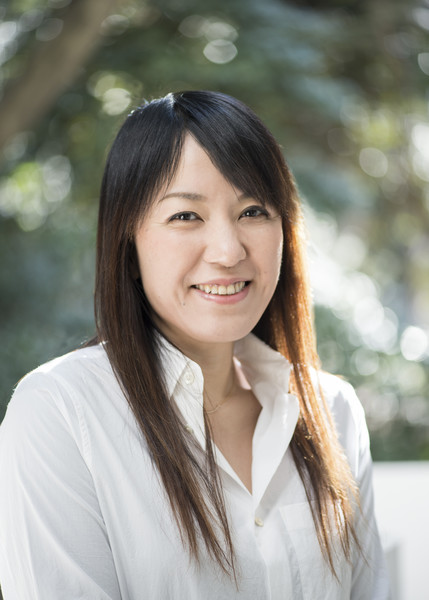
Copyright: Bungeishunju
ANN: You talked about your truancy and shared a lot of very
personal feelings in your autobiography. What made you feel like you
wanted to tell your story?
MARI OKADA: When I debuted as a screenwriter, it was for direct-to-video films, not anime. It's been exactly twenty years since then, and I thought it was an auspicious time to write my memoirs. I started with my high school days, what I did to graduate, how I didn't go to school, and the “world outside”; then I wrote about how I got into the anime industry, about the director Tetsuro Amino, and about the screenplay I wrote for him to convey who I was as a person.
This is the second time I've written about my life. This time, it's in prose form, but the idea of putting my life into words is the same. Now that it's been twenty years, and now that I've recently gotten work as a director, I figured that there was all the more reason to write about my life again. So I gave it a shot.
So does that mean that the timing of the biography close to the announcement of Maquia - When the Promised Flower Blooms was deliberate?
Honestly, it wasn't deliberate. I just happened to write the biography as I was working Maquia. I submitted the pitch for Maquia five years ago, and I worked on it for three years. As for biography, I wrote it during a time when Maquia's production wasn't so busy. I was holed up at the P.A. Works studio the whole time so I wrote the biography there. The editor of the biography, Mr. Shimoyama, would come visit me at the studio in Kodaira.
The main studio of P.A. Works is in the Toyama Prefecture, right?
Right. Toyama's a really tranquil place. I would go to Toyama for the animation meetings; we would talk about how the character expressions should look and discuss each cut, and so on. At those times, we'd stop at a nearby bungalow, which was around a twenty minute walk from the studio. You could just look out a window and see it. It makes me think, “What a nice place.” You should go there sometime.
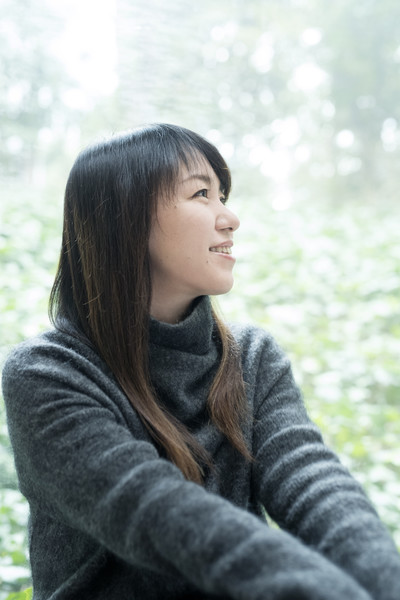
Copyright: Bungeishunju
What did Mr. Horikawa (President of P.A. Works) think about the biography during that time?
He fussed over me like a mother hen. He was worried that writing about my life would have an emotional toll on me. There was a long period of time when I couldn't talk about my truant years, but even now that I can talk about it, it still takes courage to share that in front of so many people. If I didn't also write about what happened after school and how I became a screenplay writer, I would probably have decided I was better off not writing a biography at all.
But even then, Mr. Horikawa worried about me. After working with him for so long, he's become not quite family, but like a relative to me. He works on the farm on his off days, so he's got a sense of perspective that's different from the rest of the industry. It's hard to describe. I guess you could say he's very down-to-earth, someone you can depend on.
You first “came out” about your truant past in a screenplay you wrote for Tetsuro Amino. At that time, he told you to dig deeper into the mother's character. Was that something you thought about when writing Maquia?
I didn't set out to write Maquia about the mother's character. As a director, I focused more on the indelible bonds and relationships between people. For example: a married couple can cease their union, but a child can't erase their relationship with their parent even if they want to. That's why the characters in the film, like Maquia, can't let go of their family. It's because she doesn't want to part ways with Erial that she wants to be a mother, to be family. Looking at it from another perspective, she doesn't specifically need to be a mother, which is why I didn't particularly think of my own mother as I was writing Maquia.
So the theme is “bonds” rather than motherhood?
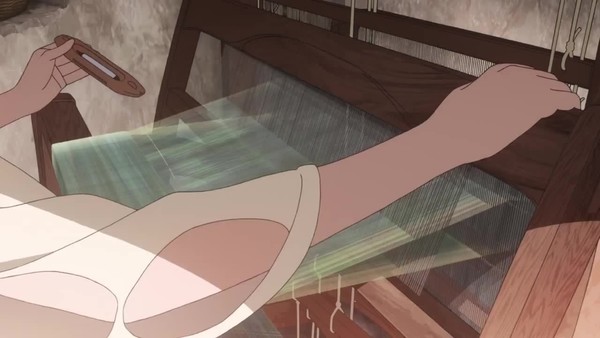
Right. It's about people influencing each other. There's a cloth called “hibioru” in the film, which people weave their feelings into. But now that you mention it, even though I wasn't consciously thinking about parent and child relationships at the outset, I suppose it was something that naturally colored the film as I was writing it. Rather than my own mother, I thought about the mothers around me: my friends and people I'd met in the past. My perspective of my mother as a child also came into it as well.
That reminds me of a scene in Maquia where Maquia says to Erial: “Don't cause trouble for me!”
This was something I observed from my friends and the mothers around me: people have this idea of what a mother should be. There are a lot of people who get those ideas into their heads because of what other people tell them. Maquia isn't based off my mother so much as the idea of what a mother should be. Instead of being mad at Erial in that scene, she's angrier at herself for not living up to the ideal. It's like she's berating herself - at least, that's how I felt writing it.
You said that when it looked like anohana was going to be set in Chichibu, “I was the only one whose blood ran cold.” So what made you change your mind and end up even having The Anthem of the Heart set there as well?
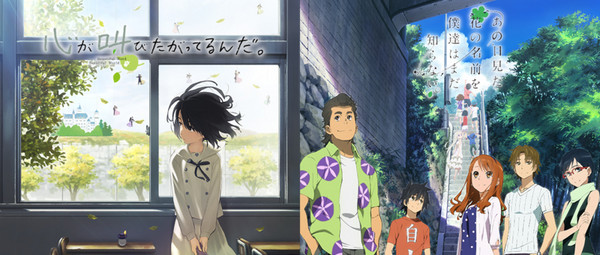
As I wrote in my biography, I objected at first to setting anohana in Chichibu. Afterwards, the fans gave so much support that I found myself thinking that everything turned out for the best, but still, I requested strongly that The Anthem of the Heart be set in a different location. I told the director and producers to stop using Chichibu, which was why we actually went location scouting in different towns, taking photos and whatnot. But in the end, the director said, “It has to be Chichibu.” (laughs)
I couldn't overturn the director's decision at the time, but that's why I made sure that Maquia had a fantasy setting. Although there were some things that were used as reference, we couldn't actually go to any places and take photos; it's a setting that doesn't exist anywhere in the world.
Was there a privacy issue?
Not quite. For a setting that doesn't exist anywhere, you can have references, but if you use Chichibu as a setting you can go one step further: you can use the photos you take as the layouts for a scene. These days, there are a lot of animators who use real-life locations as layouts, which makes it easier for them to draw through that angle or perspective. If the layouts aren't indicated in the storyboards, then the animators won't be able to draw it. So the staff use photos as blueprints, in a certain sense.
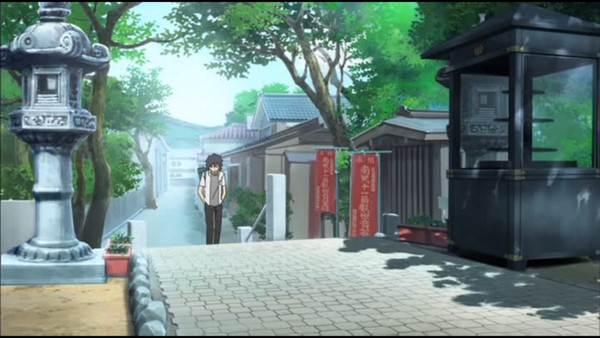
In Chichibu's case, we already had a lot of photos from anohana. We also had a lot of reference materials. And, most importantly, the director said that he preferred Chichibu over anywhere else. Also, another reason we keep taking photos in the same location is because it's relatively cheap and easy to get to. So it got to the point where I was like, “Looks like I'm stuck with Chichibu.”
To be fair, Chichibu is a unique place. There are no rice paddies, just a lot of fields. It's quite rare for a rural area in Japan to have no rice paddies, you know? So if we used a different area in rural Japan, the vibe would have been different. Also, the director Nagai is from Niigata, a place with a lot of rice paddies. And, you know, nobody really wants to use their hometown as a location. It felt like they admired my hometown because it wasn't what they had grown up with.
Would you still feel embarrassed about setting an anime in Chichibu these days?
I wouldn't go as far to say I'd feel embarrassed, and it does get easier to write a story when I'm familiar with the location. On the other hand, I could get too caught up with the realism and it would constrain the scope of the story. The same thing applies if it's a location that anime fans regard as a pilgrimage spot even if I've never been to it. Say, for instance, I'm depicting a river and there's a field next to it in real life. I can't make that area have wild grass instead even if that's how I'd like to imagine the scene. That's why I ended up writing a screenplay where I can put the grasslands wherever I want them to be.
I imagine that if I wasn't from Chichibu and I wrote a screenplay that was set there, we'd have to investigate the place to see if it had fields or wild grassland. But since I'm from Chichibu, I'd know the area well enough already that I wouldn't even think to write a scene with a different backdrop. That puts a limiter to what I can write; there might be a sense of realism to the story, but that has its pluses and minuses.
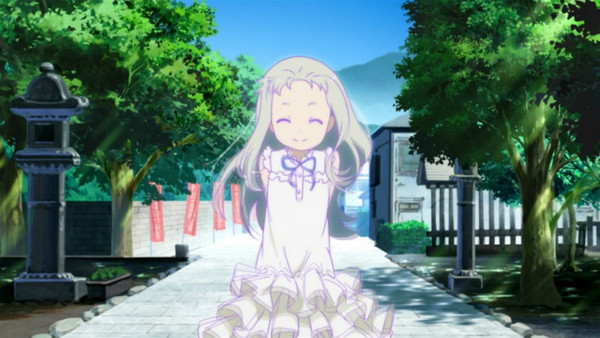
In your autobiography, you wrote: “After becoming acquainted with the difficulties of adaptation and challenging it many times over, I lost any particular desire to write original stories.” Recently, however, you've been doing more original anime projects instead. What are your thoughts on adaptations these days?
Even now, I think of adaptations as an interesting challenge. When you turn something like a book into an anime with 20-something minute episodes, you have to think about whether to expand or condense the material. When you're condensing it, you have to consider which parts you absolutely shouldn't cut. On the other hand, if you're adding things frivolously, you could end up diluting the appeal of the original material. You also need to make sure that each episode has a beginning, middle, and end; it won't be satisfying if it's not a distinct viewing experience in its own right. All of these things make writing adaptations a challenge. By making the right editing choices, you have to preserve all the emotions that were present in the original. It's hard work, but it's also fun.
Of course, I've been doing originals lately, but I do want to do adaptations as well.
So are there any adaptations you want to work on?
This is changing the subject a bit, but I've been working on an original manga called Araburu Kisetsu no Otome-domo yo (Maidens of the Savage Season). It's full of girls who want to have sex. I've also been writing a novel - although that's a separate thing. Writing my own manga and novels, I've thought, “Wouldn't it be nice for this to get adapted into an anime?” and I end up writing them like a screenplay. (laughs)
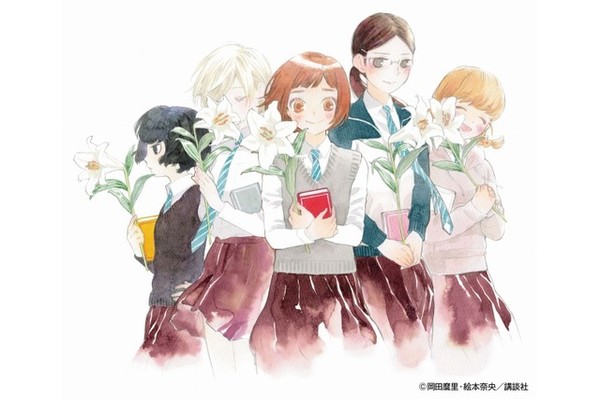
You also handled the novelization for anohana, right?
I wrote the anohana novels as the anime was airing, and continued after the series had finished. The second book took about a year. I'm primarily a screenwriter, so doing the anohana novelization was really hard. When you're turning an anime or manga into a novel, there are so many things you can't include.
Although I did have to think about what to cut and what to keep, there aren't really any huge events in anohana's case. It's about a group of boys and girls coming to terms with Menma's death. The changes don't happen through big events; it happens gradually through the small things. It's easy enough to condense the story, but when it's constructed with all these little details, removing them makes it so much harder to retain the impact. To compensate, I came up with new events specifically for the novel. That was pretty fun. It was difficult work, and it took over a year, but it was a fun challenge that I'd like to try again sometime.
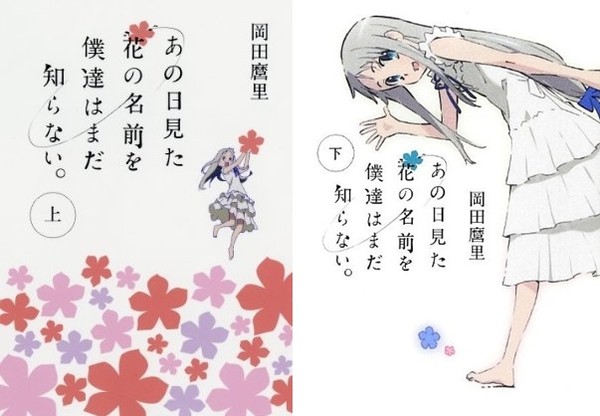
Going by your own personal experiences in anime screenwriting after creating anohana, to what extent do you think that the artist can be separated from their art?
The fun of anime is that it's a collaborative work made by many people. Even if I wrote the script, the overall impression of the story changes when the lines are voiced, and so on. In the past, I used to change the lines, but these days when people show me their storyboards at meetings, the art would bring a different sense of perspective, and I would tell them, “Do it more like this.” During the compositing phase, I'd say, “Make the stars shine more brightly,” and so on. That was the case with Maquia, for instance. If you were to ask me who is responsible for how the overall picture looks, I'd say it's the result of everyone's effort, and I think that's a good thing.
anohana started because I made a challenge to myself to write a charismatic truant protagonist. I may have been a truant, but I was never a protagonist, so I didn't set out to put myself into the story. I wanted to use my experiences as a springboard for a more interesting story.
As for the matter of self-expression, the screenplay is like the top batter in an anime production. The screenplay lets out the first shot, and the stronger the strike is, the more it resonates with everyone else like ripples from a wave. On the other hand, if my strike is weak, then the others will only follow along perfunctorily. That's why I want to write screenplays that can resonate with the staff and bring out their best efforts. And in order to write such screenplays, I try to include some experiences or other things that have left a strong impression on me. It's a bit different from wanting to write about myself exactly.
You described how you lost self-confidence when you were writing The Anthem of the Heart, and were afraid to write the screenplay. These days, what do you do when you experience lapses in self-confidence?

I still experience fear that my work isn't good, and I wouldn't say that I overcame it. (laughs) I agonize over my work every single time, but this is also the kind of job where those fears can ultimately temper and improve the final product. So I just keep at it.
It's not often that people in the anime industry write an autobiography. Whose biography would you want to read?
I had to think about this one a lot. (laughs) This isn't a straight answer, but there's a guy at P.A. Works named Nobuhiro Kikuchi. He comes from Toyama, just like Horikawa. He doesn't specialize in anime, and I don't suppose he'd ever joined an anime studio. I'll have to confirm this, but he didn't know anything about anime production. But he was an upperclassman to Horikawa in university, and even now he's involved in the administrative side of P.A. Works. He doesn't have an anime background at all - I think he was into mail order service? He's unusual in this business, and on top of that, he's always talking about how he wants to realize Horikawa's vision.
I'm really interested in their relationship and how a person outside the anime industry became involved with anime production on such an intimate level. He has a different perspective, which is fascinating, and he's in Toyama, too. I'd like to know about his day-to-day life in Toyama. There aren't many people like him, so I'd like to know how he got into the anime industry, even considering his relationship with Horikawa. I'm just really curious.
There are all sorts. (laughs)
(laughs) But, you know, most people in the anime industry got there because they love anime and want to make it, which is why I'm curious. Also, he's into the business and administrative side, and that's really unique among people into anime. So I think it would make an interesting story.
How do you feel about From Truant to Anime Screenwriter being translated into English? Is there anything you'd like to say to your overseas fans?

I'm really grateful and honored. I'm really happy to hear that you translated it so promptly. (laughs) I do wonder if there were will be some parts, like my experiences in school, that would be difficult for readers in other countries to understand, but I do think that anyone who has ever been through puberty can probably relate to what a difficult and frustrating time that is. I hope that people overseas will read the book and share their impressions.
Our thanks to Mari Okada and J-Novel Club for this opportunity. Check back Friday, May 4 for an exclusive excerpt from From Truant to Anime Screenwriter!
Source : animenewsnetwork.com
KONTAK PERKASA FUTURES - A series of coincidences led me to cross paths with this screenwriter-cum-director. Last year, she released her autobiography, titled From Truant to Anime Screenwriter: My Path to anohana and The Anthem of the Heart, which I summarized in an article here on ANN. Later on, when J-Novel Club licensed the book in English, I was asked to translate it.
In preparation for the English eBook release on May 5, we present this interview with Mari Okada, which delves into the themes of From Truant to Anime Screenwriter and her recent work as a director.

MARI OKADA: When I debuted as a screenwriter, it was for direct-to-video films, not anime. It's been exactly twenty years since then, and I thought it was an auspicious time to write my memoirs. I started with my high school days, what I did to graduate, how I didn't go to school, and the “world outside”; then I wrote about how I got into the anime industry, about the director Tetsuro Amino, and about the screenplay I wrote for him to convey who I was as a person.
This is the second time I've written about my life. This time, it's in prose form, but the idea of putting my life into words is the same. Now that it's been twenty years, and now that I've recently gotten work as a director, I figured that there was all the more reason to write about my life again. So I gave it a shot.
So does that mean that the timing of the biography close to the announcement of Maquia - When the Promised Flower Blooms was deliberate?
Honestly, it wasn't deliberate. I just happened to write the biography as I was working Maquia. I submitted the pitch for Maquia five years ago, and I worked on it for three years. As for biography, I wrote it during a time when Maquia's production wasn't so busy. I was holed up at the P.A. Works studio the whole time so I wrote the biography there. The editor of the biography, Mr. Shimoyama, would come visit me at the studio in Kodaira.
The main studio of P.A. Works is in the Toyama Prefecture, right?
Right. Toyama's a really tranquil place. I would go to Toyama for the animation meetings; we would talk about how the character expressions should look and discuss each cut, and so on. At those times, we'd stop at a nearby bungalow, which was around a twenty minute walk from the studio. You could just look out a window and see it. It makes me think, “What a nice place.” You should go there sometime.

What did Mr. Horikawa (President of P.A. Works) think about the biography during that time?
He fussed over me like a mother hen. He was worried that writing about my life would have an emotional toll on me. There was a long period of time when I couldn't talk about my truant years, but even now that I can talk about it, it still takes courage to share that in front of so many people. If I didn't also write about what happened after school and how I became a screenplay writer, I would probably have decided I was better off not writing a biography at all.
But even then, Mr. Horikawa worried about me. After working with him for so long, he's become not quite family, but like a relative to me. He works on the farm on his off days, so he's got a sense of perspective that's different from the rest of the industry. It's hard to describe. I guess you could say he's very down-to-earth, someone you can depend on.
You first “came out” about your truant past in a screenplay you wrote for Tetsuro Amino. At that time, he told you to dig deeper into the mother's character. Was that something you thought about when writing Maquia?
I didn't set out to write Maquia about the mother's character. As a director, I focused more on the indelible bonds and relationships between people. For example: a married couple can cease their union, but a child can't erase their relationship with their parent even if they want to. That's why the characters in the film, like Maquia, can't let go of their family. It's because she doesn't want to part ways with Erial that she wants to be a mother, to be family. Looking at it from another perspective, she doesn't specifically need to be a mother, which is why I didn't particularly think of my own mother as I was writing Maquia.
So the theme is “bonds” rather than motherhood?

Right. It's about people influencing each other. There's a cloth called “hibioru” in the film, which people weave their feelings into. But now that you mention it, even though I wasn't consciously thinking about parent and child relationships at the outset, I suppose it was something that naturally colored the film as I was writing it. Rather than my own mother, I thought about the mothers around me: my friends and people I'd met in the past. My perspective of my mother as a child also came into it as well.
That reminds me of a scene in Maquia where Maquia says to Erial: “Don't cause trouble for me!”
This was something I observed from my friends and the mothers around me: people have this idea of what a mother should be. There are a lot of people who get those ideas into their heads because of what other people tell them. Maquia isn't based off my mother so much as the idea of what a mother should be. Instead of being mad at Erial in that scene, she's angrier at herself for not living up to the ideal. It's like she's berating herself - at least, that's how I felt writing it.
You said that when it looked like anohana was going to be set in Chichibu, “I was the only one whose blood ran cold.” So what made you change your mind and end up even having The Anthem of the Heart set there as well?

As I wrote in my biography, I objected at first to setting anohana in Chichibu. Afterwards, the fans gave so much support that I found myself thinking that everything turned out for the best, but still, I requested strongly that The Anthem of the Heart be set in a different location. I told the director and producers to stop using Chichibu, which was why we actually went location scouting in different towns, taking photos and whatnot. But in the end, the director said, “It has to be Chichibu.” (laughs)
I couldn't overturn the director's decision at the time, but that's why I made sure that Maquia had a fantasy setting. Although there were some things that were used as reference, we couldn't actually go to any places and take photos; it's a setting that doesn't exist anywhere in the world.
Was there a privacy issue?
Not quite. For a setting that doesn't exist anywhere, you can have references, but if you use Chichibu as a setting you can go one step further: you can use the photos you take as the layouts for a scene. These days, there are a lot of animators who use real-life locations as layouts, which makes it easier for them to draw through that angle or perspective. If the layouts aren't indicated in the storyboards, then the animators won't be able to draw it. So the staff use photos as blueprints, in a certain sense.

In Chichibu's case, we already had a lot of photos from anohana. We also had a lot of reference materials. And, most importantly, the director said that he preferred Chichibu over anywhere else. Also, another reason we keep taking photos in the same location is because it's relatively cheap and easy to get to. So it got to the point where I was like, “Looks like I'm stuck with Chichibu.”
To be fair, Chichibu is a unique place. There are no rice paddies, just a lot of fields. It's quite rare for a rural area in Japan to have no rice paddies, you know? So if we used a different area in rural Japan, the vibe would have been different. Also, the director Nagai is from Niigata, a place with a lot of rice paddies. And, you know, nobody really wants to use their hometown as a location. It felt like they admired my hometown because it wasn't what they had grown up with.
Would you still feel embarrassed about setting an anime in Chichibu these days?
I wouldn't go as far to say I'd feel embarrassed, and it does get easier to write a story when I'm familiar with the location. On the other hand, I could get too caught up with the realism and it would constrain the scope of the story. The same thing applies if it's a location that anime fans regard as a pilgrimage spot even if I've never been to it. Say, for instance, I'm depicting a river and there's a field next to it in real life. I can't make that area have wild grass instead even if that's how I'd like to imagine the scene. That's why I ended up writing a screenplay where I can put the grasslands wherever I want them to be.
I imagine that if I wasn't from Chichibu and I wrote a screenplay that was set there, we'd have to investigate the place to see if it had fields or wild grassland. But since I'm from Chichibu, I'd know the area well enough already that I wouldn't even think to write a scene with a different backdrop. That puts a limiter to what I can write; there might be a sense of realism to the story, but that has its pluses and minuses.

In your autobiography, you wrote: “After becoming acquainted with the difficulties of adaptation and challenging it many times over, I lost any particular desire to write original stories.” Recently, however, you've been doing more original anime projects instead. What are your thoughts on adaptations these days?
Even now, I think of adaptations as an interesting challenge. When you turn something like a book into an anime with 20-something minute episodes, you have to think about whether to expand or condense the material. When you're condensing it, you have to consider which parts you absolutely shouldn't cut. On the other hand, if you're adding things frivolously, you could end up diluting the appeal of the original material. You also need to make sure that each episode has a beginning, middle, and end; it won't be satisfying if it's not a distinct viewing experience in its own right. All of these things make writing adaptations a challenge. By making the right editing choices, you have to preserve all the emotions that were present in the original. It's hard work, but it's also fun.
Of course, I've been doing originals lately, but I do want to do adaptations as well.
So are there any adaptations you want to work on?
This is changing the subject a bit, but I've been working on an original manga called Araburu Kisetsu no Otome-domo yo (Maidens of the Savage Season). It's full of girls who want to have sex. I've also been writing a novel - although that's a separate thing. Writing my own manga and novels, I've thought, “Wouldn't it be nice for this to get adapted into an anime?” and I end up writing them like a screenplay. (laughs)

You also handled the novelization for anohana, right?
I wrote the anohana novels as the anime was airing, and continued after the series had finished. The second book took about a year. I'm primarily a screenwriter, so doing the anohana novelization was really hard. When you're turning an anime or manga into a novel, there are so many things you can't include.
Although I did have to think about what to cut and what to keep, there aren't really any huge events in anohana's case. It's about a group of boys and girls coming to terms with Menma's death. The changes don't happen through big events; it happens gradually through the small things. It's easy enough to condense the story, but when it's constructed with all these little details, removing them makes it so much harder to retain the impact. To compensate, I came up with new events specifically for the novel. That was pretty fun. It was difficult work, and it took over a year, but it was a fun challenge that I'd like to try again sometime.

Going by your own personal experiences in anime screenwriting after creating anohana, to what extent do you think that the artist can be separated from their art?
The fun of anime is that it's a collaborative work made by many people. Even if I wrote the script, the overall impression of the story changes when the lines are voiced, and so on. In the past, I used to change the lines, but these days when people show me their storyboards at meetings, the art would bring a different sense of perspective, and I would tell them, “Do it more like this.” During the compositing phase, I'd say, “Make the stars shine more brightly,” and so on. That was the case with Maquia, for instance. If you were to ask me who is responsible for how the overall picture looks, I'd say it's the result of everyone's effort, and I think that's a good thing.
anohana started because I made a challenge to myself to write a charismatic truant protagonist. I may have been a truant, but I was never a protagonist, so I didn't set out to put myself into the story. I wanted to use my experiences as a springboard for a more interesting story.
As for the matter of self-expression, the screenplay is like the top batter in an anime production. The screenplay lets out the first shot, and the stronger the strike is, the more it resonates with everyone else like ripples from a wave. On the other hand, if my strike is weak, then the others will only follow along perfunctorily. That's why I want to write screenplays that can resonate with the staff and bring out their best efforts. And in order to write such screenplays, I try to include some experiences or other things that have left a strong impression on me. It's a bit different from wanting to write about myself exactly.
You described how you lost self-confidence when you were writing The Anthem of the Heart, and were afraid to write the screenplay. These days, what do you do when you experience lapses in self-confidence?

I still experience fear that my work isn't good, and I wouldn't say that I overcame it. (laughs) I agonize over my work every single time, but this is also the kind of job where those fears can ultimately temper and improve the final product. So I just keep at it.
It's not often that people in the anime industry write an autobiography. Whose biography would you want to read?
I had to think about this one a lot. (laughs) This isn't a straight answer, but there's a guy at P.A. Works named Nobuhiro Kikuchi. He comes from Toyama, just like Horikawa. He doesn't specialize in anime, and I don't suppose he'd ever joined an anime studio. I'll have to confirm this, but he didn't know anything about anime production. But he was an upperclassman to Horikawa in university, and even now he's involved in the administrative side of P.A. Works. He doesn't have an anime background at all - I think he was into mail order service? He's unusual in this business, and on top of that, he's always talking about how he wants to realize Horikawa's vision.
I'm really interested in their relationship and how a person outside the anime industry became involved with anime production on such an intimate level. He has a different perspective, which is fascinating, and he's in Toyama, too. I'd like to know about his day-to-day life in Toyama. There aren't many people like him, so I'd like to know how he got into the anime industry, even considering his relationship with Horikawa. I'm just really curious.
There are all sorts. (laughs)
(laughs) But, you know, most people in the anime industry got there because they love anime and want to make it, which is why I'm curious. Also, he's into the business and administrative side, and that's really unique among people into anime. So I think it would make an interesting story.
How do you feel about From Truant to Anime Screenwriter being translated into English? Is there anything you'd like to say to your overseas fans?

I'm really grateful and honored. I'm really happy to hear that you translated it so promptly. (laughs) I do wonder if there were will be some parts, like my experiences in school, that would be difficult for readers in other countries to understand, but I do think that anyone who has ever been through puberty can probably relate to what a difficult and frustrating time that is. I hope that people overseas will read the book and share their impressions.
Our thanks to Mari Okada and J-Novel Club for this opportunity. Check back Friday, May 4 for an exclusive excerpt from From Truant to Anime Screenwriter!
Source : animenewsnetwork.com
- Get link
- Other Apps